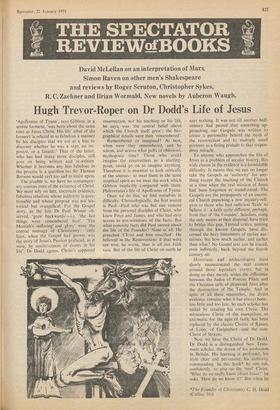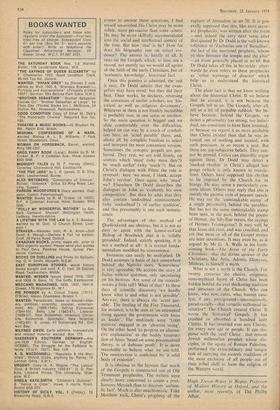THE SPECTATOR 4?
REVIEWABOOKS
David McLellan on an interpretation of Marx Simon Raven on other men's Shakespeare and reviews by Roger Scruton, Christopher Sykes, R. C. Zaehner and Brian Wormald. New novels by Auberon Waugh.
Hugh Trevor-Roper on Dr Dodd's Life of Jesus
`Apollonius of Tyana', says Gibbon, in a serene footnote, 'was born about the same time as Jesus Christ. His life' (that of the former) 'is related in so fabulous a manner by his disciples that we are at a loss to discover whether he was a sage, an im- postor, or a fanatic.' That of the latter, who has had many more disciples, still goes on being written and re-written. Whether it becomes any less fabulous in the process is a question (as Sir Thomas Browne would say) too sad to insist upon.
The trouble is, we have no contempor- ary sources even of the existence of Christ. We must rely on late, uncertain evidence, fabulous relations whose authority is ques- tionable and whose purpose was not his- torical but evangelical. For the Gospel story, as the late Dr Paul Winter ob- served, 'grew backwards'—i.e. 'the last things were remembered first'. 'The Messiah's suffering' and glory' were the central message of Christianity : 'only later, when the Gospel had grown, was the story of Jesus's Passion prefaced, as it were, by reminiscences of events in his life'. Dr Dodd agrees. Christ's supposed resurrection, not his teaching or his life, he says, was `the central belief about which the Church itself grew'; the bio- graphical details were then 'remembered'.
Remembered or imagined? At best, when were they remembered, and by whom, and across what gulfs of oblivious, mythopoeic time? Those who could imagine the resurrection as a starting- point, could go on to imagine anything. Therefore it is essential to look critically at the sources: to treat them in the same sceptical spirit as we treat the work which Gibbon implicitly compared with them, Philostratus's life of Apollonius of Tyana.
Once we do this, we find ourselves in difficulty. Chronologically, the first source is Paul—Paul who was but one remove from the personal disciples of Christ, who knew Peter and James, and who had easy access to eye-witnesses of the facts. But what concrete facts did Paul record about the life of the Founder? None. at all. He preached 'Christ and him crucified'. He believed in the Resurrection: if that were not true, he wrote, then is all our faith vain. But of the life of Christ on earth he says nothing. It was not till another half- century had passed that something ap- proaching our Gospels was written to create a personality behind the myth of the resurrection and to multiply small portents as a fitting prelude to that stupen- dous miracle.
To anyone who approaches the life of Jesus as a problem of secular history, this wide chasm in the evidence is a formidable difficulty. It means that we can no longer take the Gospels as 'authority' for any- thing except the teaching of the Church at a time when the real mission of Jesus had been forgotten or transformed. The Gospels are the propaganda of an uncriti- cal Church preaching a new mystery-reli- gion to those who had sufficient `faith' to believe it : a faith quite different, perhaps, from that of 'the Founder'. Scholars, using the only means at their disposal, have tried to bridge this gap.,Textual critics, peering through the known Gospels, have dis- cerned the hazy lineaments of earlier nar- ratives; but how much earlier, and earlier than what? No Gospel text can be traced, even indirectly, back beyond the fourth century AD.
Historians and archaeologists have slowly reconstructed the real context around those legendary events. but in doing so they merely widen the difference between the Judea of Pontius Pilate and the Christian cells of dispersed Jews after the destruction of the Temple. And in spite of all these researches, the direct evidence remains what it has always been: too little and too late. So each scholar has ended by creating his own Christ. The miraculous Christ of the evangelists, so axiomatic for the ages of faith, haS been replaced by the elusive Christs of Renan, of Loisy. of Guittnebertand the non- Christ of Strauss.
Now we have the Christ of Dr Dodd. Dr Dodd is a distinguished New Testa- ment scholar, the doyen of his profession in Britain. His learning is profound, his style clear and persuasive, his authority commanding. In this book* he sets out, confidently, to give us the 'real' Christ. `What do we really know about Jesus'?' he asks. 'How do we know it'?' But when he *The Founder of Christianity C. H. Dodd (Collins 35s)
conies to answer these questions, I find myself unsatisfied.His Christ may be more subtle, more persuasive than some others. He may be more skilfully accommodated into the social and intellectual context of the time. But how 'real'. is he'? How far does his biography rest on tested evi- dence? The answer is, -hardly at all. It rests on the Gospels which, to him, are a record. not merely (as we would all agree) of the faith of the early Christians, but of `authentic knowledge', historical fact. -
Once this premiss is admitted, the rest is easy. Dr Dodd admits that the evan- gelists may have erred; but they did their best. Their works, he declares, reversing the consensus of earlier scholars, are 'his- torical as well as religious documents'. Whatever in them is not frankly incredible
. is probably true, in one sense or another. So the main question is begged and we slide comfortably over the difficulties, helped on our way by a touch of symbol- ism here, an 'acted parable' there, and, above all, by complete freedom to select and interpret the most convenient version. Sometimes the synoptic gospels are pre- ferred. They rest, we are told firmly, on sources which 'must' (why must they?) be 'much earlier' (why 'much'?). But on Christ's dialogue with Pilate the rule is reversed : here `we must, I think, accept John's version'. Once again, why 'must' we'? Elsewhere Dr Dodd describes the dialogues in John' as 'evidently his own composition'. But then he adds that they also contain 'undoubted reminiscences' (why `undoubted"?) 'of earlier tradition', and this presumably is one such reminis- cence.
The advantages of this method of Quellenkritik are obvious, but it is not so .easy to agree with the honest-to-God Bishop of Woolwich that it is 'solidly grounded'. Indeed, strictly speaking, it is not a method at all: it is textual funda- mentalism modified by convenience.
Instances can easily be multiplied. Dr Dodd assumes 'a basis of fact somewhere behind' the Nativity story. 'Somewhere' is very agreeable. He accepts the story of Judas without question, only speculating on his motives. Are some of the miracle- stories a little tall? What of that? In these days of scientific discovery 'we hardly know what is and what is not possible'. Anyway, there is always the 'acted par- able'. The feeding of the Five Thousand, for instance, is to be seen as 'an attempted rising against the government with Jesus as leader'. The multitude were '5,000 patriots' engaged in an 'abortive rising'. On the other hand `to propose an alterna- tive explanation' to the bodily resurrec- tion of Jesus 'based on some preconceived theory, is of dubious' profit'. It is more reasonable to believe what we are told. The resurrection is confirmed by 'a solid body of evidence'.
It is obvious to the layman that much of the Gospels is constructed out of Old Testament prophecies. The writers were clearly more concerned to create a post- humous Messiah than to discover 'authen- tic fact'. Much is also anachronistic. Take Matthew xxiii, Christ's prophecy of the
capture of Jerusalem in AD 70. It is gen- erally supposed that this, like most accur- ate prophecies. was written after the event —and indeed the very next verse after that quoted by Dr Dodd is the well-known reference to 'Zacharias son of Barachias', the last of the martyred prophets, 'whom ye slew between the temple and the altar' —an event generally placed in AD 68. But Dr Dodd takes all this in his stride: after- wards he even refers to these prophecies as 'sober warnings of disaster' which help us to understand the historical Christ.
The plain fact is that we know nothing about the historical Christ. If we believe that he existed, it is not because the Gospels tell us so. The Gospels, after all, tell us a lot of palpable rubbish. We be- lieve because, behind the Gospels, we detect a personality too strong, too indivi- dual, too 'consistent to have been invented; or because we regard it as more probable that Christ existed than that he was in- vented out of nothing and located, with such precision. in so recent a past. But these too are subjective beliefs. They can- not be proved. Critics can plausibly argue against them. Dr Dodd may detect a `marked rhythm' in Christ's alleged lan- guage (which is only known in transla- tion). Others have supposed this rhythm to be imposed by the Church for its liturgy. He may sense a particularly con- crete idiom. Others may reply that this is merely the gnomic style of peasant speech. He may see the 'unmistakable stamp' of a single personality behind the parables. But has not the same unmistakable stamp been seen, in the past, behind the poems of Homer, the Sibylline verses, the sayings of Hermes Trismegistus? it may well be that Jesus did exist, and was crucified, and yet that most or all of the Gospel stories are later inventions. It may even be, as is argued by Mr G. A. Wells in his forth- - coming book—The. Jesus of the Early Christians—that the divine saviour of the Christians, like Attis, Adonis, Dionysus, Mithras, is himself a myth.
What is not a myth is the Church. For twenty centuries the elusive, enigmatic semi-mythical figure of Christ has been hidden behind the.ever thickening tradition and structure of the Church. Who can know, who now cares, what human cata- lyst, if any. precipitated—unconsciously, paradoxically—that versatile millennial in- stitution? The Church created Christ. It wrote the 'historical' Gospels. It has crushed or absorbed a hundred later Christs. It has invented ever new Christs, for every new age or people. It can dis- pense' with the 'real' Christ: that remote Jewish millenarian prophet whose dis- ciples, in the agony of Roman Palestine, performed the extraordinary and unique task of carrying the esoteric traditions of the most exclusive of all people out of their tribal shell to form the religion of the Western world.
Hugh 'Trevor-Roper is Regius Professor of Modern Hi%fory at Oxford, and the author, most recently, of The Philby Affair,






































 Previous page
Previous page